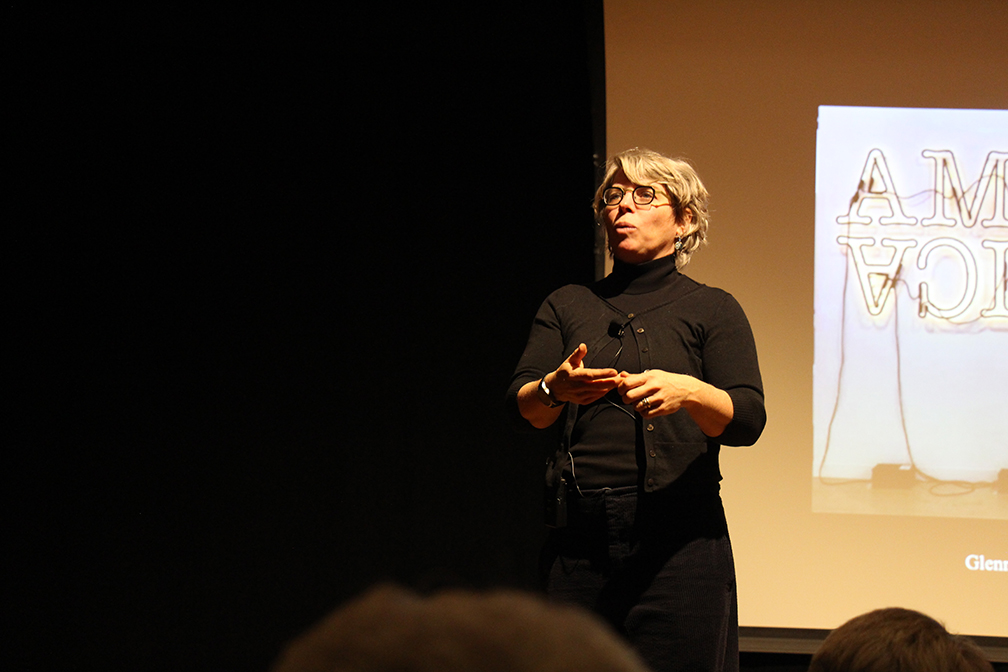Jill Lepore discusses US political climate
December 6, 2019
 Mindy Leder
Mindy LederJill Lepore H’15 is worried about the nation, and she thinks that you should be too.
“It has often been said, in the 21st century and in earlier centuries, too, that Americans lack a shared past and that, built on cracked foundations, the Republic is crumbling,” writes Lepore in the introduction to “These Truths,” her 930-page single-volume history of the United States, published in September 2018. “The United States is founded on a set of ideals, but Americans have become so divided that they no longer agree, if they ever did, about what those ideas are, or were.”
The narrative of this centuries-long contest over the idea of America formed the throughline of Lepore’s Kenneth V. Santagata Memorial Lecture which she delivered before a packed Kresge Auditorium on Thursday night.
Lepore, the David Woods Kemper ’41 Professor of American History at Harvard University, is a prolific American historian, journalist and public intellectual who has written 11 monograph-length works, one of which earned her a Bancroft Prize and two of which have been nominated for Pulitzers. She also contributes regularly to The New Yorker, where she has been a staff writer since 2005.
Over the course of her 45-minute talk, Lepore offered an abridged version of the story of America that she tells in “These Truths,” of the nation from before it was a nation to 2016–which, she admitted, feels like a “very long time ago.”
“It’s a ridiculously ambitious project,” Lepore said of “These Truths.” “It’s a little bit like if you’ve ever seen the complete abridged works of William Shakespeare. Yes, I’ve somehow managed to compare myself to William Shakespeare.”
Pacing back and forth across the Kresge stage, Lepore used graphic representations of America—everything from Aztec maps to early republican political cartoons to Jasper Johns paintings—to illustrate how America, as much a set of ideals as a geographical unit, has never been an uncontested concept. From Columbus to Trump, Lepore argued, America has existed in between what it is and what its citizens, defenders and critics believe it ought to be.
Covering over four centuries of history, Lepore attempted to give “a sense of change over time,” as debates over the nature of America, who counts as American and who gets to say who counts as an American have evolved—or stayed the same.
Although distilling 400 years down to a single narrative is no small task, according to Lepore, it’s important to try.
“Our past is as polarized as our present,” Lepore said. “Most political arguments are actually just super abridged historical arguments. ‘Make America Great Again’ is a four-word interpretation of all of American history.”
Lepore’s own three-word interpretation? Up on the screen flashed a demonstrator holding a sign reading “WTF.”
“I did write ‘These Truths’ with the idea that it could—and it was my hope that it would—reach a wide audience, that it’s not engaged in an ideological battle really with anyone,” said Lepore in an interview with the Orient. “I get a lot of emails from readers of that book, a lot of people who are studying for the citizenship exam … people who say ‘I don’t really feel like I belong somehow,’ or it’s been a very painful experience immigrating to this country, and that there was something about the experience of reading the book that’s made them feel they belonged.”
Many of the attendees believe that Lepore’s talk was a success, pointing to the skill with which she convened a broad topic.
“I thought it was fascinating,” said local resident Al Miller, who attended the talk. “I had no idea how she [was] going to cover what she did, but she has a good sense of humor, great presentation. She’s wicked quick.”
Students also enjoyed the talk.
“It was an ambitious endeavor,” said Gabrielle Maffezzoli ’20. “She’s got this 1,000-page volume and she tried to sum it up in 45 minutes, but despite that challenge I enjoyed it, and I thought she did a good job. I’ve now just got her book and got it signed, so I’m feeling inspired.”
Asked to offer a prediction of the direction of American democracy, Lepore declined, citing the “secrets of the historian’s guild.”
“What the hell is going on? [That] is my final exam question for you.”

Comments
Before submitting a comment, please review our comment policy. Some key points from the policy: